- Home
- S. A. Barton
I Pledge Allegiance
I Pledge Allegiance Read online
License Notes
This ebook is licensed for your personal enjoyment only. If you’re reading this book and did not purchase it, or it was not purchased for your use only, then please purchase your own copy. Thank you for helping a self-published author.
I Pledge Allegiance
Contents:
Pledge 1
Escape
Pledge 2
Connect with S.A. Barton
By S.A. Barton
Copyright 2014 S.A. Barton
“I pledge Allegiance to the flag
of the North American Union
and to the Republic for which it stands,
One nation under the Lord, Jesus Christ
who grants Liberty and Justice to All.”
#
I recite it from the screen with a smile, emphasizing the bolded words, my face a mask of enthusiasm. The smile is required. So is the emphasis. The menu won't progress unless I do it 'right', and truancy is a misdemeanor for student and parents. A felony, on the third offense.
#
ENTER BIOMETRIC SCAN OF FINGERPRINT TO CONTINUE
#
FINGERPRINT RECOGNIZED
SWIPE CREDIT/DEBIT CARD TO CONTINUE
#
APPROVED
NAUD $0.125/INSTRUCTIONAL HOUR
ENTER DNA IDENTITY SCAN TO CONTINUE
#
I stick my thumb in the slot under the fingerprint scanner and a surface like fine sandpaper licks the skin like a cat's tongue. The screen displays a segmented don't-tread-on-me snake chasing its own tail in a figure 8: working.
#
WELCOME KESHAWN BOLLING
Options
((1)) Citizenship: Yr11Mo8: Pretest: Economic Obligations of the Citizen to the State
((2)) Mathematics: Yr11Mo6: Study Exercise: Algebra: Basic Competency: Binomials
((3)) History: Yr11Mo3: Lecture: Vulnerabilities of Democratic Governmental Forms and their Practical Remedies
((4)) Elective: Yr9Mo12: Lecture: Photography: Composition of Images For Esthetics and Legality
#
I know I should catch up on the history. The number in front of that option blinks sluggishly: mild urgency. If I neglect it for another couple of weeks, it will begin to flash more quickly. After that, my other options will disappear.
Most of my options disappeared, in reality, before I was born, before my parents were born, in the First American War. The Second American War and the War of American Unity nailed the coffin lid down.
The History option isn't there for most students after Year 6. It's there for me because the Citizenship Test Panels everyone takes at the end of Year 5 decided that my career would be Instructor: Correctional Facility. A specialized prison guard, a political re-educator. My Pa's position probably has something to do with that, along with my more-than-average intelligence.
The smart ones are the ones they want to keep close, in the heart of the system, under maximum surveillance. Smart is dangerous.
I touch the elective icon instead, and tap my bulky camera to the spot indicated on the screen. My homework images upload. I hate the camera's bulk, its jellybean neon-green color; it was the smallest and least gaudy I could find. Law dictates a camera must be a minimum of 8 inches by 6 by 3 and cased in plastic of a high-visibility color. Cameras must be easy to spot; unauthorized photography is a felony.
I'm not worried about the non-elective classes anymore.
I expect to be gone by the time the rest of my options disappear.
If the man standing behind me is with who I think he is. I wonder how he'll avoid being picked up for questioning when I'm gone.
#
“Playing hooky, kid?” the man says, setting his coffee and muffin down on the battered tabletop opposite my own coffee. I look up from my tablet, let the textbook go black. He's broad across the shoulders, chest and upper arms heavy with muscle, looks like Army except for his close-trimmed salt and pepper beard, well under the 2” legal maximum length. Army on local police duty, then. My legs tense with the urge to run, to disappear. I force my face to smile, not hard after years of insincere Pledges of Allegiance, and take a deep breath.
“Registered day off, sir,” I say. Army men are always sir with a smile. I offer my thumb. “Please scan me to verify, sir.” I'd rather spit in his fat privileged face.
He pushes his coffee to the side with the back of his hand and leans in close over the yellow poppyseed-topped muffin.
“Calm yourself, Keshawn,” he says quietly. Between us, he brings a finger up and teases a few long strands out of his hair, which I had thought was all safely under the 4” legal maximum for men.
He twists half a dozen hairs around his finger and raises an eyebrow at me. The hairs are at least double the legal length. They protrude from over his left ear for an instant before he tucks them away again. They're a symbolic forelock, worn very thin so he can tear it off and throw it away if arrest is immanent.
He's a secret Jew, a living felony offense. He has given me power over him by showing me that forelock, a dangerous act. He must be one of the people I've been trying to reach since 9th year, with careful hint-phrases in approved online discussion forums and on paper slips left in key library books, carefully inscribed and carried wrapped in blank paper so they can be left without fingerprints.
I hope he's one of them. He could easily be an agent of the secret police. But if I don't take a chance I might never get another one.
“30th Street Labor Center, 8AM,” I whisper, then I lean back, pick up my tablet, and stand. I'm not fool enough to try to have a prolonged discussion somewhere so public.
“Thank you sir,” I say in a calm conversational tone, “but I'm a student. If I fail I might have to do day labor, but I've got no plans to fail.” I turn and walk out without waiting for an answer and head home. Day labor recruiters are common in the city. Even the gainfully employed often solicit for the 10% finder's fee the labor centers offer. Pretending he offered me work is a good cover, I hope. It has to be. After all, I've got no plans to fail.
On the other hand, nobody does. But the Correctional Centers are always full.
#
“Hey, Ma,” I say over the dinner dishes with the water running. I'm washing, she's drying. Pa has gone to his study to work on the constant documentation his job requires. He's Army, local Police division. Another privileged face; this time, no chance I'm mistaken—but I do love him, too. But while I might love him, I don't like or trust him. This isn't a conversation I can have with him around; I'm certain he'd turn me in.
“What is it, baby?” Ma asks. I'll be baby to her for as long as she lives, never mind I'm six feet tall and have to trim my facial hair every day, running a 1/8” clipper over my face and neck. I can't shave clean; I'd like to, to seem younger, less imposing, to draw fewer hostile looks from police on the street. My deep black skin already gets me too many looks from the mostly Caucasian and Hispanic cops. The beard, this last year, has made it worse. But the razor bumps eat me alive if I shave clean. I've tried.
I turn up the water louder, let the plate I'm holding rattle the bowls in the wash water.
“Hire someone to watch me tomorrow,” I say, voice low. Half of the appliances are voice activated and every microphone is on 24/7, government computers listening for red flags. “30th Street. I'll show you who.”
“Oh,” she says, and that's it. I imagine she must have sounded like that when Pa asked her to marry him, a happy little gasp. She's known I've wanted out for a couple of years now. She puts her towel down and hugs me, I let the plate go into the wash water and hug her back. I'm always surprised by how small she is, only a little thick and her head hardly comes up to my shoulder. She's happy for what makes me happy.
She's never told Pa I want out, I'm certain. That says it all about him in my eyes. Maybe he was different when I was little, but he's an Army man through and through now. But I will miss Ma.
#
In the morning Ma swipes her card in the house tablet and calls an autocab.
“30th Street Labor Center,” she tells it, then waves her hand though the VERIFY dialogue box projected in the air.
People still call it rush hour, but there are no old-style traffic jams. Central computers coordinate vehicles perfectly; with private cars restricted to top political occupations only. Neighbors share autocabs often, keeping the traffic density manageable. The ride is smooth; the traffic lights are relics, colorful gargoyles decorating the intersections. The autocab regulates its speed so it never has to stop until it reaches its destination. The red lights are always casting their warnings in the distance, but nobody really notices—because of all of the closer distractions, because the traffic never stops.
At the labor center, I hold Ma's hand and let her appear to be leading me. But from a half-step behind I guide her with firm pressure along the rows of hopeful day laborers. There are more workers than there are jobs for; thirty percent of the population is assigned to Laborer: Nonspecific and set loose to fend for themselves, most with a Year Six education or less.
I see the broad-shouldered secret Jew and guide Ma to him. Her finger hovers, two workers to the left. My eyes downcast, peering just high enough to see her finger, I twitch her hand right, right, squeeze.
“You,” she says. “Can you watch my son at school and make sure he logs a full seven instructional hours, and pays attention to them? One dollar now, one dollar when you deliver him home. He'll pay the autocab with his card.”
“Two and two,” he says.
“One and two, firm,” Ma says. Laborers are expected to bargain, a nod to entrepreneurship, but not to bargain too much. They're lowlier than anyone but a beggar. And three bucks less twenty percent for the Labor Center and forty percent for taxes is about the going rate for a day of light work. It leaves the worker enough to pay for a cot and two meals in a bachelors' housing hall.
“Done,” he says. He doesn't offer to shake on it—women don't shake. It would be a misdemeanor indecency. In fact, it almost violates 'public decency' that she's at the Labor Center, unaccompanied and hiring a worker, at all. But, as the 'For the Ladies' releases from the NAU Department of Moral Hygiene have it, children are part of the household and a mother's job is the household's upkeep, so it's still okay for her to hire someone to watch me do my schoolwork. At least for now. A few of the men, laborers and employers, still cast suspicious glances at her.
Business done, we follow her outside and she calls an autocab from her pocket tablet. The one we arrived in is gone; autocabs never wait. Our wait for the new one, though, is not long either. Outside of times when large public rallies are held, more than five minutes would be unusual.
“I'm John Porter, by the way, ma'am,” the secret Jew says as we wait at the curb outside. I glance at him, then away. Playing the part of moderate resentment. He doesn't look like a John Porter to me. An alias? I wouldn't begin to know how having an alias would be possible. Identity is DNA and fingerprint tracked from birth. Maybe I'm thinking overdramatically, excited by our subterfuge. I breathe deep. Remain calm.
“Mrs. Bolling,” Ma says. Not Jacklyn Bolling. She's keeping it formal, detached, leaving my plans to me. My respect for her and her good practical sense rises even higher.
“Keshawn Bolling,” I say, realizing they're both looking at me while my mind wanders. I keep my eyes down. The autocab glides to a stop in front of me. I hold the door for Ma and get in after her, in the front seat, letting 'John' seat himself in the back. Skilled labor, Army, or a political would rate the front and I, as the child, would sit in back. Unskilled labor, though... back seat.
The autocab lets John and I out at the school, then heads off, taking Ma home.
“Let's get this over with,” I say, and head into the school. Still playing the part of resentment at being chaperoned.
“Yes, sir,” John says behind me, following. “Let's.”
It takes longer than usual to get inside; with John in tow we both have to wait in the manual preinspection line for a guard to scan John's card and verify that he's been hired to work inside the school today. Then we're motioned through one of the body scanner machines, then have to step aside again to be manually wanded and frisked. By the time we reach my room and cubicle, it's fairly quiet; most of the other students have already recited the Pledge and logged on.
I work quickly. Lecture and video portions can't be rushed, but I can rush through reading and solving math problems. I often do, so I'm not breaking character. I'd rather hurry and cut an hour off the school day, any day. At the half hour lunch break I order an extra apple and give it to John along with my packet of corn chips.
“Thanks for staying out of my business and keeping quiet,” I say while we eat, thanking him for doing the opposite, I hope, with subtle emphasis.
“I understand,” he says, and twitches the corner of his mouth in a momentary almost-smile. I believe he does.
On the way home, I stop the autocab beside a public park.
“I need some exercise,” I tell John. “You know, it's a citizen's duty to stay fit.” He seats himself on the pale, weather-worn wood of the single stand of bleachers there, one foot resting higher than the other on the bottom bleacher row, elbow on knee, chin resting on his fist. It's a weird stance and I get the feeling it should remind me of something, that 'John' is trying to send me a message, but it doesn't. I run laps around the athletic field until the sweat runs freely, then a couple more, pushing myself. I've always pushed myself; it's why I want out. There's nowhere to push to. You just obey.
“We'll walk the rest of the way home,” I tell him when I'm done, and we start to walk. It's a mile and a half; that gives us time to talk, finally. If we avoid talking in the silences between passing cars, audio surveillance will find it nearly impossible to register our words. Looking down at the pavement, video interpretation won't be able to read our lips.
As we talk, he says what I've been hoping to hear. He's part of the Underground Launchpad. I believe him, even if I don't believe his name is John.
“We don't dally, Keshawn,” he says. “Not in a case like yours where there's no good cover for sustained contact, where it's problematical to integrate you into a cell.”
I think for a few steps.
“How long?”
“Tomorrow morning. Leave half an hour early. Say, for a candy bar and to stretch your legs. Stop at the 24-7 on Founders Street, and walk the rest of the way to school.”
“Anything else?”
“Bring nothing you wouldn't normally bring. And don't fight. It's going to look like a kidnapping.”
I cough and fight the urge to ask why. There is resistance to the government's iron hand. Religious resistants, secular resistants. Kidnappings (and murders) of family members of military members happen.
So, according to rumor, are there underground sex and labor rings, and a black market in healthy young organs for the aging upper political class.
The consequences of guessing wrong about 'John' come into sharp focus. I really know nothing but what he's told me. By tomorrow afternoon, I could be a slave, or be parts in a dozen coolers, slated to keep old powerful men alive.
We pass an alley. Nearly invisible, black on dark dumpster green, LIVe FRee or DIe is scrawled. Surely by morning it will be gone, blocked out with thick slops of industrial grade olive drab paint.
Likely, the author will disappear, too.
This is no way to live.
“Okay,” I say. We walk the rest of the way to my home in silence.
#
A hand shakes me awake. I lie still, eyes closed, straining at my memory. Did I leave home, buy the candybar, let my arranged ambush happen? I don't remember it. I remember coming home
, dinner, washing dishes, bed...
The hand shakes again, harder. I open my eyes. Pa is there, shaved head bumps and scars silvered in the moonlight slipping through the vertical prison bar blinds. Tight coiled dots of dark hair pepper his chest; there's salt in there, too. Pa's not old, but not young anymore, either, like he was when I was small.
One of his arms twitches slightly, something clicks soft and dull, dim dry-blood-red numbers begin to count off silent on a slick black soap-cake of a box he holds in that hand. It's the same slick plastic black color as the loose athletic trunks he sleeps in. I sit up. In the dark I can see the numbers on the box:
57
56
55
He looks down at them, too. We look up at the same time. Our eyes meet.
“Anything you need to tell me, son?” he asks, voice soft as the breeze outside the window.
52
51
50
Our eyes, deep dark as the night, hold each other in the shadows. Time passes, uncounted.
“No,” I finally whisper.
His lower lip trembles for a moment. I wonder if I'm really seeing it, if it's a trick of the light. Moonlight gathers at the corner of one of his eyes. He blinks it away and looks down at the box again.
22
21
20
“I love you, son,” he says.
He closes my door softly behind him and leaves me sitting up, awake, blinking. I lie back, pull the sheet up to my chin against a chill that isn't there, except deep inside.
What does he know?
Is he playing a mind game with me?
My eyes drift closed without my deciding to close them.
Should I stay home tomorrow? I haven't been absent all year. It wouldn't be suspicious. Maybe if I go, I'll be arrested instead of spirited away.
Or maybe I should go anyway, try anyway, not lose this chance, however small, however uncertain. I lie back and close my eyes.
I dream dark, shapeless dreams, aware of my room and my awkward body and my tangling sweaty sheets, until the alarm jars me awake with the feeling that I haven't slept at all.

 Maiden Flight
Maiden Flight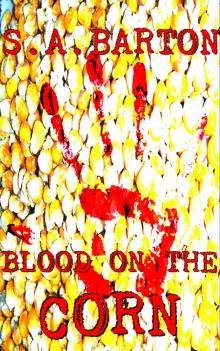 Blood on the Corn
Blood on the Corn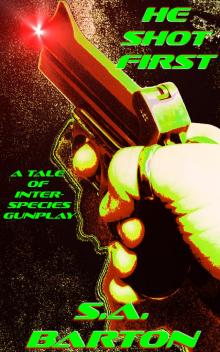 He Shot First
He Shot First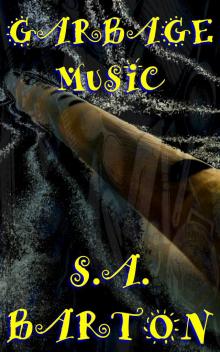 Garbage Music
Garbage Music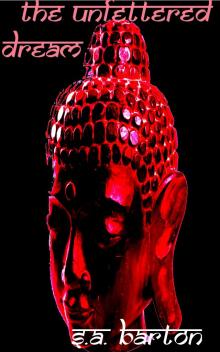 The Unfettered Dream
The Unfettered Dream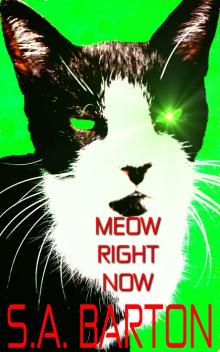 Meow Right Now
Meow Right Now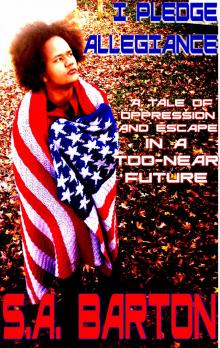 I Pledge Allegiance
I Pledge Allegiance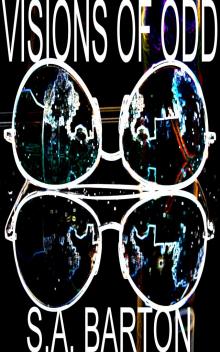 Visions Of Odd
Visions Of Odd Spoken Wood
Spoken Wood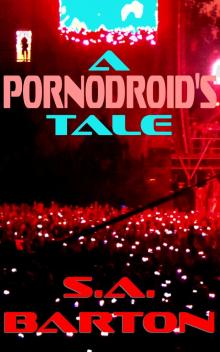 A Pornodroid's Tale
A Pornodroid's Tale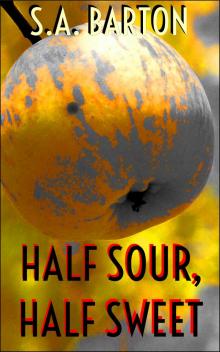 Half Sour, Half Sweet
Half Sour, Half Sweet